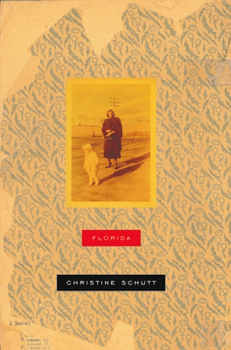Florida
Select Format
Select Condition 
Book Overview
Finalist for the 2004 National Book Award Florida is the portrait of the artist as a young woman, an orphan's story full of loss and wonder, a familiar tale told in original language. Alice Fivey, fatherless at age seven, is left in the care of her relatives at ten when her love-wearied mother loses custody of her and submits to the sanitarium and years of psychiatric care. A namesake daughter locked in the orphan's move-around life,...
Format:Hardcover
Language:English
ISBN:0810151502
ISBN13:9780810151505
Release Date:October 2003
Publisher:Triquarterly Books
Length:152 Pages
Weight:0.88 lbs.
Dimensions:0.7" x 5.8" x 8.8"
Customer Reviews
2 ratings
"Mother had used overcooked bacon for a bookmark..."
Published by Thriftbooks.com User , 18 years ago
Nominated for the National Book Award for this debut novel, Christine Schutt creates an impressionistic and moving picture of young Alice Fivey's difficult life from age five, when she is left fatherless, until she is in her thirties. When her mother's mental problems lead to her stay in "the San" within a year of her father's death, Alice is shuttled among family members, living at various times with her Uncle Billy and Aunt Frances, who systematically appropriate her mother's belongings, and for several years with Nonna, her grandmother, who is bedridden and unable to talk. Schutt presents short, jewel-like memories of the past as they come unbidden to the growing Alice, filling them with the kind of descriptive detail which children remember so vividly. As Alice tries to reconcile the present with the past, she confronts and tries to understand life's big issues--acts of fate, illness, death, and love and their effects on families and one's dreams. Her peripatetic childhood leaves her without strong family role models and even less guidance, but she does form several meaningful friendships which are crucial to her development--with Arthur, a family retainer, and with Mr. Early, her high school English teacher, who encourages her writing talent. When Alice, in her twenties, reconnects with her mother, she tries to sort through her mother's confused recollections to learn something about her father, but she also learns much about her mother and about the family dynamics involving her parents, her grandmother, and her aunt and uncle. As time passes and death takes its toll on those around her, Alice dreams about all the might-have-been moments, wishing that she could "look at the clock to see how much time you have left." Repeating symbols unify the novel. Alice's parents believe that "In Florida...it was good health all the time," and Florida becomes a symbol for the good life. Arthur even makes a "Florida" for her mother, a sun-tanning box which her mother uses during the winter. Her mother's self-destructive relationship with someone named Walter, leads Alice to refer to other men in bad relationships as "Walter," while Arthur, the humble man whose kindness and desire to serve never flags, is the Good Man. Slowly, Schutt assembles a picture of Alice, her life and family, and her special friends--Arthur and Mr. Early--while illustrating her growing independence and strength. Presented in spare, simple style which avoids melodrama, the novel uses the intimate scene, the unique observation about life, and the poetic detail to flesh out and bring to life the story of Alice and her family. n Mary Whipple
A rite of passage
Published by Thriftbooks.com User , 19 years ago
In blissful prose that demands attention, Schutt is ruthless, brutal and passionate, as she tells the story of a motherless daughter. From the beginning I am in tears, so deeply does this small novel reach into the hidden places of my heart. Even while the author's transcendent words fill me, my mind reaches to my own mother, in her final days railing against a world she refused to relinquish.Alice, namesake daughter, is a child born to survive her environment, with a mother who seeks emotional safety in confinement to a sanatorium. There follows a series of homes, but never one of her own and a need to find comfort in a world bereft of comfort, after her father's death and mother's virtual abandonment.In her ensuing sleep-over life, little Alice must always ask, "may I...?", remain unobtrusive, be pliant, flattering. Moving from her Uncle Billy and Aunt Frances' possession-filled, strict-ruled, child-proofed home to her Nonna's luxurious estate, Alice spills her heart out to an old woman who can barely move, rendered speechless by a stroke. Her sleep-over life motherless and rudderless, Alice grows up with a vengeance, scraping a private existence from the leftovers of others.Meeting her mother again later in California, the two women move cautiously around each other. In prose that reads like poetry, Alice describes this mother in a series of stark, hurtful observations and the realities of her own life as the generations turn full circle, Alice the woman, a mother almost indistinguishable from the silent Nonna.Women of a certain age, and there are many, will find this part of the novel exquisitely painful, full of recognition. Florida reflects a validation of women, their ability to survive the direst of circumstances. Here is understanding for the terrible errors made by family, both intentional and unintentional. In the end, Alice's mother is "an old woman, made innocent". So are they all, their frail bones leached of ill intentions, forgiven by years of attrition. This slight book contains the experience of a lifetime, ridged with sorrows and shallow joys too meager to squander. Florida is a rite of passage and an exorcism of grief; I am in awe of this author`s talents. Luan Gaines/2004.





